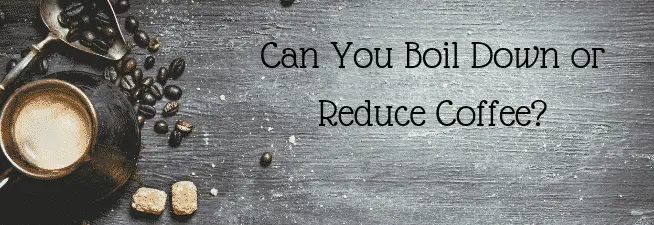
Reducing coffee is a method that isn’t particularly in fashion or a popular way of doing things. Rarely do regular people see much about this in the everyday world because of its infrequent use.
Most individuals will be very unlikely to encounter this need often. But some may be curious about how reduction applies to coffee.
Reduction and What it Means
Reduction is a term that means to thicken a liquid that is being used in the cooking process.
This can add taste and create a nice addition to any dish in regards to things such as wine and sauces – both of which can be reduced.
Often the reduction is put on top of the main dish before serving as a finishing touch that can make the platter even more appealing to those planning to dine on it.
The most common method of reduction is boiling down. It will affect the concentration of the ingredient via evaporation through the heating up of the liquid.
Cooks can also achieve this through simmering, which is another way to to reduce depending on the specific circumstances.
Can You Boil Down or Reduce Coffee?
The answer to this lies in the specific properties of coffee. A better question is whether or not coffee can be reduced to make a flavorful creation.
The goal is to end up with a result of similar caliber to things like a soup that can be reduced well and are done with a generally successful outcome.
Keeping that in mind, it is not recommended that individuals try to reduce coffee through boiling or simmering. It can lead to over-extraction which, as a rule of thumb, should be avoided at all costs because of its negative effects such as an increased sourness to the coffee.
Even still let’s look into this a little deeper…
What Happens When You Boil Coffee?
Boiling coffee may seem like an acceptable alternative to brewing coffee if one does not have access to a working coffee maker, but for several reasons this method should never be recommended. Here is what happens when you boil coffee.
Improper Flavor Extraction
Boiling coffee, heating up water and adding the coffee grounds to allow them to steep, should primarily never be used because there is a high change of improper extraction. Improper extraction of the coffee’s natural flavors can occur if the coffee is steeped for too long or for too little. This fine line for perfection makes it hard to master boiling coffee.
The idea of heat extracting the coffee’s flavor is normal, as this is what happens when you brew coffee as well. The difference is that your coffee maker regulates the water’s temperature and the length of time the coffee grounds are steeped. This regulation is hard to master without the use of proper thermometers and close attention.
Results of Improper Flavor Extraction
When coffee’s flavor is improperly extracted the resulting cup can either end up being overly bitter or underwhelmingly weak.
With prolonged heat applied, coffee loses most of its flavor. At this point, over extraction has occurred and the resulting cup will taste weak.
With minimal heat applied, coffee experiences the opposite; under-extraction occurs and the resulting cup is overly bitter.
If coffee is left exposed to heat for excessively long the coffee can even burn. At this point and with this result it is not likely the coffee drinker will try to boil coffee again.
The Basic Science Behind The Extraction of Solids & Chemicals From Coffee
Why does improper extraction lead to a poor tasting cup of coffee?
Well, coffee’s flavor is a product of its natural sugars and acids.
When coffee is exposed to excess heat, these sugars and acids dissolve leaving only the bitter pieces of the coffee’s flavor profile behind.
But, Boiling is the ONLY WAY I Can Have My Coffee?
I hear you. If you are camping or without a coffee maker, boiling coffee maybe your only way to experience that morning cup.
Therefore, if you really have too. Like, really have too! You should follow these steps:
- Boil the water
- Remove from heat
- Wait 30 seconds
- Pour water over coffee
Another Aspect to Consider: Slow Reduction Negatively Affects Flavor
When it is boiled down coffee can lose the core of its flavor. This is because the fragile aroma is taken away and the complexity is gotten rid of through the process.
As a result of all this the coffee drinker is left with only a sour, and even bitter, beverage that is not up to the standards most people aspire to.
Predominantly this is the reason why people are advised against reducing or boiling coffee, both being one and the same.
Now, with that behind us let’s look into the health implications of boiled coffee.
Is Boiled Coffee Bad For You?
This question is a common one. However, it is important we distinguish our answer to this question into two separate subsequent answers.
When asking this question it is important to distinguish between “bad for your health” and “bad for your taste buds”.
Don’t worry, we will answer both!
Does Boiled Coffee Taste Okay?
As we’ve covered above already, the answer here is a resounding no for most people.
You may have heard of “Cowboy Coffee” or the reputation it possesses as a bitter and quite unbearable beverage. Cowboy Coffee is simply another name for boiled coffee. Therefore, it is unlikely that this method of producing drinkable coffee will result in a desirable cup of joe.
Most commonly, coffee that is boiled experiences improper flavor extraction due to its prolonged exposure to the high temperatures of boiling water. A coffee maker normally brews coffee around 195 degrees Fahrenheit (or 91 degrees Celsius). Exposure to higher temperatures quite possibly could cause the coffee to burn.
Coffee that underwent improper flavor extraction or was burnt will not result in a rewarding cup.
Now we know that boiled coffee is bad for one’s taste buds, but could boiled coffee be bad for one’s health?
Does Boiled Coffee Negatively Affect Your Health?
The answer is a faint, yeah, maybe.
The NCBI, National Center For Biotechnology Information, recently conducted studies that produced interesting results. The center found that is a strong correlation between the consumption of boiled coffee and spiked cholesterol levels.
These findings have yet to be supported by other research experiments, though the verdict may soon be public as more and more researchers are taking the time to investigate this occurrence.
Though supporting data has yet to be found to prove there is a relationship between cholesterol levels and boiled coffee, this has not stopped researchers from speculating as to why this association may occur.
The most plausible explanation suggests that boiled coffee’s negative impact on one’s health are a result of boiled coffee’s lack of filtration. Since boiled coffee is brewed without any filters more of the coffee’s natural oils are present in the consumed beverage. These oils may spike one’s cholesterol.
What All This Means
The ability to use a reduction properly is a valuable tool that any cook should have in their repertoire. And it truly is a great skill to have when hoping to take cooking to the next level. It can add a whole new layer to any dish and craft the perfect balance of ingredients.
However, this is not usually the case with coffee.
Because of its properties, coffee is not the ideal candidate for reduction. It can throw off the delicate flavor profile and leave only a bad aftertaste that no one wants to have in their much-beloved cup of coffee.
For those people interested in making coffee syrups or concentrates there are better processes for doing this which we will cover in future articles.
References:
Aubrey, A. (2006, September 28). Coffee: A Little Really Does Go a Long Way. Retrieved from https://www.npr.org/2006/09/28/6155178/coffee-a-little-really-does-go-a-long-way
